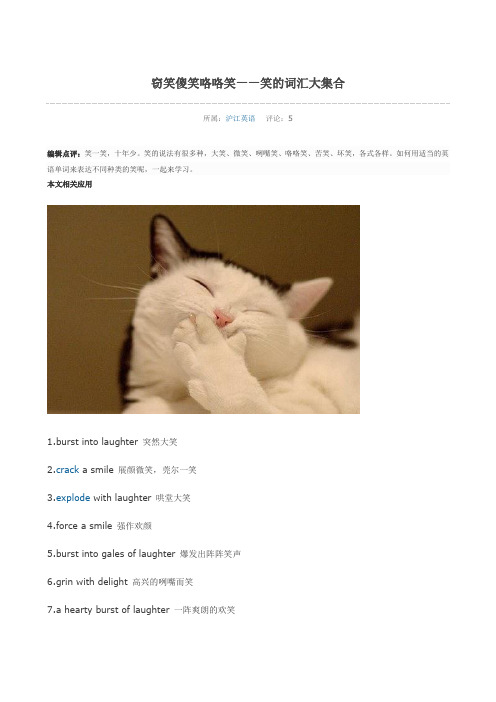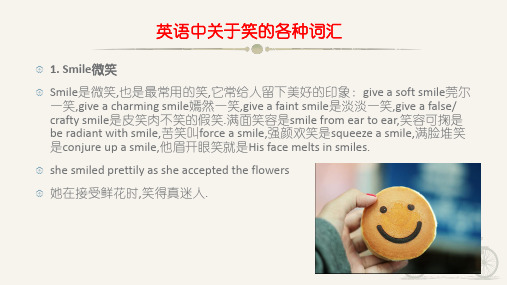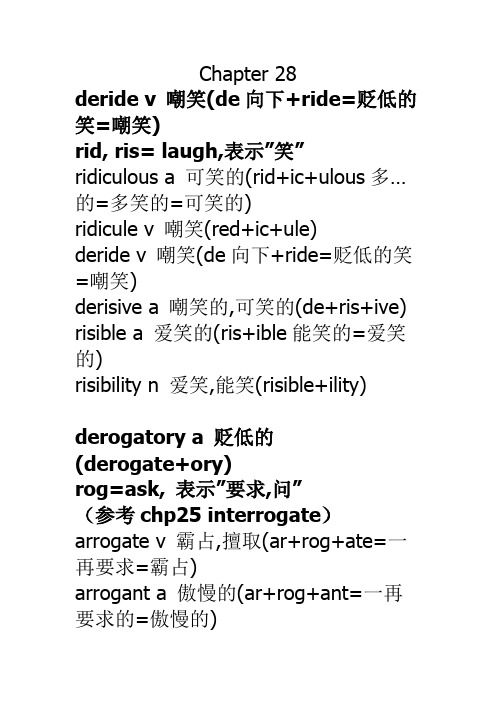英语中关于“笑”的各种词汇
社交礼仪英语词汇大全成为社交场合的佼佼者

社交礼仪英语词汇大全成为社交场合的佼佼者在社交场合中,正确运用社交礼仪是成为佼佼者的关键。
而要在国际社交场合中游刃有余,掌握一些社交礼仪的英语词汇也是非常重要的。
本文将为大家提供一个社交礼仪英语词汇大全,帮助你在各种社交场合中表现得得体得体。
下面,我们将分为几个主题来介绍这些词汇。
1. 问候和介绍在社交场合中,与他人交往的第一步通常是问候和介绍。
以下是一些常用的社交礼仪英语词汇:- Greetings(问候)- Good morning/afternoon/evening(早上/下午/晚上好)- How do you do?(你好吗)- Nice to meet you(很高兴见到你)- May I introduce myself?(我能够自我介绍吗)- Allow me to introduce Mr./Mrs./Miss...(允许我介绍先生/夫人/小姐...)- Pleased to meet you(很高兴见到你)2. 礼仪规则和行为在社交场合中,遵守礼仪规则和展示良好的行为举止是非常重要的。
以下是一些相关的词汇:- Etiquette(礼仪)- Polite(有礼貌的)- Respect(尊重)- Manners(举止)- Smile(微笑)- Thank you(谢谢)- Excuse me(对不起)- Please(请)- Sorry(对不起)3. 交流和交谈在社交场合中,与他人进行交流和交谈是非常常见的。
以下是一些与交流和交谈有关的词汇:- Conversation(交谈)- Small talk(闲聊)- Topic(话题)- Listen(倾听)- Agree(同意)- Disagree(不同意)- Opinion(观点)- Engage(参与)4. 礼物和感谢在特殊的社交场合,如生日派对或家庭聚会中,送礼物和表达感谢是必不可少的。
以下是一些相关词汇:- Gift(礼物)- Present(礼物)- Thank you card(感谢卡片)- Appreciate(感激)- Gratitude(感谢)- Surprise(惊喜)5. 大型社交活动参加大型社交活动,如宴会、晚宴或婚礼等,也需要掌握一些特定的社交礼仪英语词汇。
关于“笑”的英文表达

窃笑傻笑咯咯笑——笑的词汇大集合所属:沪江英语评论:5编辑点评:笑一笑,十年少。
笑的说法有很多种,大笑、微笑、咧嘴笑、咯咯笑、苦笑、坏笑,各式各样。
如何用适当的英语单词来表达不同种类的笑呢,一起来学习。
本文相关应用1.burst into laughter 突然大笑2.crack a smile 展颜微笑,莞尔一笑3.explode with laughter 哄堂大笑4.force a smile 强作欢颜5.burst into gales of laughter 爆发出阵阵笑声6.grin with delight 高兴的咧嘴而笑7.a hearty burst of laughter 一阵爽朗的欢笑8.in stitches 笑不可支ugh at 嘲笑ugh it off 一笑而过ughingstock 笑料;笑柄ugh in the breeze迎风欢笑ugh oneself to death 差点没笑死ugh people around into a better humour 笑得周围的人心情好起来ugh a hearty laugh 放声大笑,开怀大笑ugh and grow fat 心宽体胖17.roars of laughter 大笑声18.a saccharine smile 谄笑,谄媚的笑19.roll in the aisles 乐不可支,笑得东倒西歪20.scream with laughter 笑得前仰后合21.snicker窃笑22.snort(讽刺、轻蔑地)高声大笑23.shriek with laughter 尖声狂笑24.smile shyly 羞嗒嗒地微笑25.beam with smiles 笑容满面;笑逐颜开26.be all smiles 笑容满面, 喜气洋洋27.toothpaste smile [美口]牙膏广告上露出皓齿的微笑28.simmer with laughter 忍俊不禁29.smile on sb. 朝某人微笑30.smirk 傻笑;假笑31.smile bitterly 苦笑32.giggle 咯咯地笑33.grin 咧嘴而笑34.grin from ear to ear 嘴咧得大大地笑35.chuckle轻声笑;咯咯笑。
各种笑的英文表达

8. Simper假笑;痴笑,傻笑
When I told him that news,he simply simpered. 当我把那消息告诉他时,他只假 笑了一下.
9. Chortle欢笑;哈哈大笑 The children chortleቤተ መጻሕፍቲ ባይዱ all the time while they were hearing the story. 孩子们听那个故事时,始终欢笑不止.
she smiled prettily as she accepted the flowers
她在接受鲜花时,笑得真迷人.
2. Laugh笑
Laugh常表示出声的笑,其程度要大于smile:哈哈大笑laugh heartily,大声狂笑 horse laugh,傻笑是laugh foolishly,狞笑是laugh grimly,暗中窃笑称laugh in one’s sleeve/ beard,笑掉大牙是laugh one’s head off,笑声阵起是burst into laughter
4. Grin露齿而笑 She was grinning with delight.她高兴得咧开嘴笑了.
5. Chuckle含笑,轻声笑
He was chuckling to himself over what he was reading. 他对自己在读的东西,暗 自发笑.
6. Snicker忍笑;暗笑通常有不敬的成分
10. Deride讥笑 They all derided his foolishness.他们都讥笑他的愚笨.
11. Guffaw 大笑;捧腹大笑 What he said aroused a blast of guffaw.他的话引起大家一阵哄笑.
表示开心大笑的英语续写短句词语笔记整理

开心大笑是人们在欢乐、愉悦、满足等情绪激动的时候所表现出的一种面部表情和语言体现。
在英语中,有许多词语和短句可以用来描述或表示开心大笑的情景,让我们一起来整理和学习这些词汇和短语。
1. Laugh out loud (LOL)这是网络用语中常见的缩写,表示大声笑出声的样子。
当我们被某些有趣或令人愉悦的事情逗得笑出声时,会用到这个词语。
2. Burst into laughter这个短语表示突然、欢快地笑出声来,通常用于描述某人因为某个笑话或情景而忍不住地大笑。
3. Cracking up这个短语意味着因为某个笑话或事件非常有趣而笑得停不下来,通常会用在朋友之间开玩笑的场景中。
4. Be in stitches意为开心到不停地笑,笑到肚子痛。
这时候,我们会用这个短语来形容自己或别人因为某个搞笑的事情而笑得非常厉害。
5. Grin from ear to ear表示笑得特别开心,面带笑容的样子。
这种笑容通常是因为受到了惊喜或者非常满意的事情而表现出来的。
6. Cheeky grin意为调皮地笑,有时候这种笑容带有一丝狡黠和俏皮的意味,是一种抓住时机逗人玩的笑容。
7. Have a good laugh这是一个固定搭配,意为开怀大笑。
当我们和好朋友聚在一起,共享一些有趣的故事或经历时,就会产生这种开怀大笑的情景。
通过以上整理的英语词汇和短语,我们可以看到,在表示开心大笑的情景中,英语中有许多丰富的表达方式,每种方式都有其独特的用法和语境。
在不同的场合,我们可以灵活运用这些词汇和短语,来描述和传达我们的开心和快乐之情。
总结回顾:在日常生活中,笑是一种非常重要的情绪表达方式,它可以传递欢乐和快乐的情感,也可以化解尴尬和紧张的气氛。
学习如何用英语来描述和表示开心大笑的情景,不仅可以丰富我们的词汇量,还可以帮助我们更好地表达和共享自己的快乐。
在交流中,适当地运用这些词汇和短语,可以让我们的语言更加生动有趣,也能够给人留下愉悦和愉快的印象。
Chapter 28-30英语词汇记忆法

Chapter 28deride v 嘲笑(de向下+ride=贬低的笑=嘲笑)rid, ris= laugh,表示”笑” ridiculous a 可笑的(rid+ic+ulous多…的=多笑的=可笑的)ridicule v 嘲笑(red+ic+ule)deride v 嘲笑(de向下+ride=贬低的笑=嘲笑)derisive a 嘲笑的,可笑的(de+ris+ive) risible a 爱笑的(ris+ible能笑的=爱笑的)risibility n 爱笑,能笑(risible+ility) derogatory a 贬低的(derogate+ory)rog=ask, 表示”要求,问”(参考chp25 interrogate)arrogate v 霸占,擅取(ar+rog+ate=一再要求=霸占)arrogant a 傲慢的(ar+rog+ant=一再要求的=傲慢的)arrogance n 傲慢(ar+rog+ance) abrogate v 取消,废止(ab去掉+rog+ate=不再要求有=取消掉) derogate v 毁损,堕落(de向下,坏+rog+ate=问下去=毁损掉) derogatory a 贬低的(derogate+ory) interrogate v 审问(inter在…中间+rog+ate=在[审问室]中问=审问) prerogative n 特权(pre预先+rog+ative=预先要求=特权) prorogue n 休会,闭会(pro前+rogue=提前问好[下一次开会日期]=休会) rogue n “无赖,骗子(无理要求者)”fabricate捏造;制作(fabric+ate)[fabric=make,表示"制作"]v.捏造,编造(谎言,借口等);建造,制造impendingimpending a 即将发生的(im进入+pend+ing=挂进来=即将发生的)pend, pens= hang, 表示”悬挂” pendant n 下垂物a. 吊着的(pend+ant) pending a 悬而未决的(pend+ing) pendulum n 钟摆(pend+ulum东西=摆着的东西=钟摆)append v 悬挂,附上(ap加强动作+pend=挂上去=悬挂)appendage n 附属物(append附上+age 表示名词=附上的东西)appendix n 附录,补遗(append+ix表名词)depend v 依靠(de加强+pend=挂在…上面=依靠)dependent a 依赖的(de+pend+ent) dependable a 可靠的(de+pend+able) independent a 独立的(in不+dependent依靠的)perpendicular a 垂直的(per全部+pend+ic+ular=全部挂着的=垂直的) suspend v 悬吊,停止(sus在…下面+pend=挂在下面=悬吊,引申为中止) suspense n 悬念,悬而未决(sus+pense=挂着[一颗心]=悬念) suspension n 中止,停学(suspend的名词)impending a 即将发生的(im进入+pend+ing=挂进来=即将发生的) macabreadj.(形容词)1. Suggesting the horror of death and decay; gruesome:恐怖的,阴森森的:令人联想起死亡和衰败的恐怖景象的;令人毛骨悚然的:macabre tales of war and plague in the Middle Ages.See Synonyms at&b{ghastly}中世纪战争和瘟疫事件令人联想起死亡和衰败的恐怖景象参见ghastly2. Constituting or including a representation of death.以死亡为主题的:组成或包括关于死亡的描述的misconstruev 误解(错误地领会了…的意思)=misinterpret【记】mis错,construe(v 解释)paramount a 最高的,首要的(para类似+mount=类似高山=最高的) mount=ascend,表示”登上”(参考chp 11 tantamount)mount n 山丘v. 登上mounted a 骑马的(mount+ed) mountain n 山(mount+ain) mountainous a 多山的,巨大的(mountain山+ous)dismount v 下车,下马(dis下+mount登上=从马上下来)surmount v 克服(困难等)(sur超过+mount=登上[山顶],超越困难) insurmountable a 难克服的(in不+surmount克服+able=不能克服的) remount v 重新登上(re再+mount=再次登上)paramount a 最高的,首要的(para类似+mount=类似高山=最高的) mountebank n 江湖骗子(mounte+bank(即bench)=登上长椅[卖假药]=江湖骗子)tantamount a 同等的,相等的(tant相等+a+mount数量)quandaryn. 困惑,窘境,进退两难(a state of perplexity or doubt)turbulent a 骚乱的(turb+ulent多….的=搅动太多=骚动的)turb= stir”表示”搅动”disturb v 扰乱,打扰(dis分开+turb=搅开了=搅乱了)disturbance n 骚动,动乱(disturb+ance) turbid a 混浊的(turb+id表形容词=搅动的=混浊的)turbine n 涡轮(turb+ine)turbulent a 骚乱的(turb+ulent多….的=搅动太多=骚动的)turbulence n 骚乱(turb+ulence) perturb v 骚乱(per始终+turb=始终搅动=扰乱)perturbaive a 扰乱的(perturb+ative) imperturbaive a 沉着的(im不+perturb+able=不受扰乱[影响]沉着的) turmoil n 混乱(tur[=turb]+moil翻腾=搅动翻腾=混乱)validate['vælideit]vt.[律]使有效, 使生效, 确认, 证实, 验证【根】val,vail=strong(强壮的),worth (价值)Chapter 29adroitadj (通常是在紧迫条件下)熟练的,灵巧的=expert=dexterous=deft 【例】an adroit tennis player 熟练的网球手【根】a一再,droit正确的-一再正确-熟练的constituent a 组成的(con+stitu+ent)s titut,stit=set up ,place,表示”建立,放”constitute v 构成,制定(con 一起+stitute=放到一起=构成) constitution a 构成:宪法(constitute+ion)constituent a 组成的(con+stitu+ent) reconstitute a 重新制定,泡水还原(re重新+constitute构成)destitute a 缺乏的,贫穷的(de没有+stitute=没有建立=缺乏的) destitution n 缺乏,穷困institute n 学会,学院v.制定,设立(in进入+stiute=建立进去=设立) institution n 制度,惯例(设立出的制度) prostitute n 妓女(pro前面+stitute=放[站]在[路]前的人=妓女) prostitution n 卖淫substitute n 替代人员v.代替(sub下面+stitute=在下面放着=代替) superstition n 迷信(super超过+stit+ion=放在[人理智]之上=迷信) superstitious a 迷信的restitute a 偿还,赔偿(re回+stitute=放回去=偿还)restitution n 赔偿,偿还contention1. The act or an instance of striving in controversy or debate.See Synonyms at discord争辩:在讨论或辩论中据理力争的行为或实例参见discord2. A striving to win in competition; rivalry:竞争:为了赢得竞争而作出的争夺;竞争:The teams met in fierce contention for first place.各队为取得第一名在激烈的竞争中遭遇3. An assertion put forward in argument.irreparableadj 无法修复的;不能挽回的;无法弥补的=irredeemable【记】reparable(adj 可赔偿的;可恢复的);repair(n /v 修理;修补)"pinnacle 顶峰,尖顶pinn=peak (顶)pinnacle 顶峰,尖顶pinnacle n 尖塔(pinn尖+acle)-acle 表名词,”…物品,状态” receptacle n 容器(recept接受) manacle n 手铐(man手,参考:manuscript手稿)miracle n 奇迹(mir惊奇,参考:mirror镜子)tentacle n 触角(tent触,摸,参考:attentive注意的,关心的) pinnacle n 尖塔(pinn尖+acle) obstacle n 障碍(ob在+sta{=stand 站}+acle=站在中间的物品=障碍) debacle n 解冻,崩溃(de去掉+bacle[=block]+acle=去掉大块东西=解冰块)platitude n 陈词滥调(plat平淡,参考:platform平台)-itude表名词,”性质,状态等” longitude n 精度(long长)latitude n 纬度,言行自由(lat宽,阔) attitude n 态度(att=apr能力,倾向) solitude n 孤独(sol单个) plenitude n 大量(plen满,多) magnitude n 重量(magn大) lassitude n 无精打采(lass懒散) beatitude n 致福,祝福(beat幸福,参考:beatify赐福)platitude n 陈词滥调(plat平淡,参考:platform平台)ineptitude n 无能,不称职(in无+ept能力)fortitude n 坚忍不拔(fort坚强,参考:fortify加强)platitude n 陈词滥调(plat+itude状态=[语言]平坦=陈词滥调)plat= flat,表示”平坦”plate n 盘子(盘子中间是平的) plateau n 平顶,高原(plat+eau 表名词=平坦地)platform n 月台,讲台(plat+form形状=形状平的地方=平台,月台)platitude n 陈词滥调(plat+itude状态=[语言]平坦=陈词滥调) promiscuous a 混杂的(pro多+misc+uous=混合得多=混杂的,滥交的)misc=mix,表示”混淆” miscellaneous a 混杂的,混合的(miscel[=misc]+aneous…的)promiscuous a 混杂的(pro多+misc+uous=混合得多=混杂的,滥交的) promiscuity n “混杂,杂乱(promiscuous,ous变成ity)”miscible a 可混合的(misc+ible能…的=能混合的)immiscible a 不能混合的(im不+miscible)nonmiscible a 不可混淆的(non不+miscible)repudiate v 拒绝,抛弃(re反+pud+iate=反过来让对方羞耻=拒绝[别人])pud=feel shame,表示”感到羞耻” repudiate v 拒绝,抛弃(re反+pud+iate=反过来让对方羞耻=拒绝[别人])impudicity n 不谦虚,无耻(in不+pud+icity=不羞耻=无耻)impudent a 无礼的(im不+pud+ent表形容词=不羞耻=无礼的)spontaneous a 自愿的,自发的(spont+aneous=自[内心]承诺=自愿的)spond, spons =promise,表示”承诺” despond v 丧气(de去掉+spond=不再承诺=使人丧气)despondent a 失望的(despond丧气+ent )respond v 回答,反应(re回+spond=承诺回去=回答)respondent n 被告a. 被告的(回答原告的人)response n 回答,答应(respond的名词) responsible a 有责任的(response回应+ible=能回应的=负责任的) correspond v 符合,通信(cor共同+respond回答=两人互相回答=通信) correspondence n 通信,来往spontaneous a 自愿的,自发的(spont+aneous=自[内心]承诺=自愿的)stigma n 污点,不名誉的事stigm=mark,表示”标志,斑点” stigma n 污点,不名誉的事stigmetize v 玷污,诽谤(stigm污点+atize表示动作=给[别人]污点=玷污) astigmatic a 散光的,歪曲事实的(a无+stigm+atic=看不到污点=散光的)Chapter 30abrasive a 有打磨作用的(ab+ras+ive)ras, rad=scrape,表示”刮擦”erase v 擦掉(e出+rase=擦出去) eraser n 橡皮,黑板擦(erase+er) abrade v 磨损(ab去掉+rade=磨擦掉) abradant n 砂纸(ab+rad+ant=用来打磨的东西=砂纸)abrasive a 有打磨作用的(ab+ras+ive) raze v 铲平,摧毁(raze=ras=擦掉=铲平) razor n 剃刀(raze+or)admonish v 训诫,警告(ad加强+mon+ish=加强警告=训诫)ad-加在在单词或词根前,表示”做…,加强…”mon, monit= warn,表示”警告” monition n 忠告,警告(monit+ion) monitor n 劝告者,监视器(monit+or=警告者)admonish v 训诫,警告(ad加强+mon+ish=加强警告=训诫) admonitory a 忠告的(ad+monit+ory) premonish v 预告,预感(pre预先+mon+ish=预先警告)premonition n 预感,前兆(pre+monit+ion)summon v (命令性)召集(sum下面+mon=从下面把人警告[命令]上来) summons n 传票,传唤(summon+s) monument n 纪念碑(monu警告,提醒+ment=提醒的东西=纪念碑)antithesis对立,反论(anti+thesis论文,观点)anti-表示”反对,相反”antiwar反战的(anti+war战争) antipathy反感(anti+pathy感情) antithesis对立,反论(anti+thesis论文,观点)antibacterial 抗菌的(anti+bacterial细菌的)antibody抗体(anti+body身体) thesis,thet= setting ,表示”放置” thesis n 论文,命题(放好的研究主题) antithesis n 对立(anti反+thesis=反着放=对立)hypothesis n 假说,前提(hypo下面+thesis=放在下面,还不能作为正式理论=假说)parenthesis n 括号(par平行+en进+thesis=平行放进去=括号) synthesis n 综合(syn共同+thesis=放到一起=综合)antithetical a 对立的(anti反+thet放+ical=反着放=对立)synthetic a 综合的(syn共同+thet+ic放=放一起)culminationNOUN:1. The highest point or state:2. The condition of being fulfilled culminate v 到达顶峰culmin=top (顶)culminate v 到达顶峰docile a 可教的,温顺的(doc+ile能…的=能教的)doc,doct=to teach, 表示”教”doctor n 博士,医生(doct教+or=教的人=有学问的人=博士)doctoral a 博士的,权威的(doctor+al) doctrine n 教义,教条(doctr+ine=教的东西=教条)doctrinaire n 空谈家a.教条的(doctrine+aire人=教条之人)docile a 可教的,温顺的(doc+ile能…的=能教的)indioclie a 难驯服的(in不+docile=不可教的)document n 文件,证书(docu[=doc 教]+ment=用来教的东西=文件) emulate 模仿,超越emul=equal (平等)emulate 模仿,超越hierarchyn.等级制度;统治集团,领导层The government is a hierarchy.政府是个官阶分明的统治集团.incapacitate使无能(in无+capacit 能力+ate=无能力)cap, capt, cept,ceive, cip,cup=take, hold, seize, 表示”拿,抓,握住”(参考chp13 emancipate)prognosis n 预测,诊断(pro在前+gnost+is=预先知道=预测)gnos(t),gnor=know,表示”知道” gnosis n 灵知(gnos+is)diagnosis n 诊断(dia 穿过+gnos+is=穿过[身体]知道=诊断)prognosis n 预测,诊断(pro在前+gnost+is=预先知道=预测) prognostic a 预兆的n.征兆( pro+gnost+ic)agnostic a 不可知论的(a不+gnost+ic=不知道的)ignore v 疏忽,不理睬(i不+geore=不知道=不理睬)ignorance n 无知,愚昧(ignore+ance) ignoramus n 不学无术的人(ignore无知+amus表示人或物=无知的人) tumultn.骚动,暴动,吵闹。
英语重点语法词汇解析fun

英语重点语法词汇解析funnyYou are funny你真可笑funny是“有趣的”,但这种有趣带着滑稽的意味,比方说小丑在台上逗观众笑,就常常要做滑稽的动作,那小丑的这种“有趣”就可以用 funny。
所以如果夸人有趣说 You are funny,对方可能会生气,心想我怎么就滑稽可笑了呢?I don't think it's funny.我觉得这没什么好笑的。
someone is fun某人有趣fun 这个单词大家平常可能都是在have fun “玩的开心”这个短语里看到,但形容人有趣的话,fun比funny更合适哦~。
someone is fun表示某人有趣,这种“有趣”是指这个人很幽默,跟这种人在一起很开心。
My grandma is great fun. Everyone likes her.我奶奶很有趣,每个人都喜欢她。
someone is interesting某人有意思interesting 也表示“有趣”,但这种有趣又和fun不一样了,指的是吸引了你的兴趣,让你觉得有意思。
比方说某档电视节目,可能不会让人时时发笑,但就是看了觉得意思,让人想继续看下去,这种情况就可以用 interesting这个单词。
所以如果说一个人 interesting,通常是说这个人有意思,让人想继续跟他做朋友。
My husband is the most interesting person I know.我丈夫是我认识的最有趣的人。
go funny≠搞笑go funny疯癫、出故障go funny 有两个意思,形容人时,表示“有点疯癫、精神失常”,一个人如果老是很滑稽,也不免被怀疑精神失常。
但如果用在东西上,就是“出了故障”的意思。
大家看到这个短语,就要注意区分是用人上,还是用在物上哦~1. After she lost her son, she went funny.她失去儿子后就变得精神失常了。
笑的各种词汇英语

笑的各种词汇英语
English: There are many different English words that can be used to describe laughter. Some common ones include chuckle, giggle, snicker, cackle, guffaw, belly laugh, chortle, snort, and titter. Each of these words describes a slightly different type of laugh, whether it's a quiet, suppressed chuckle or a loud, hearty guffaw. These words can help to convey the specific quality of someone's laughter and add depth and nuance to descriptions of humor and amusement.
中文翻译: 有许多不同的英语词汇可以用来描述笑声。
一些常见的包括chuckle, giggle, snicker, cackle, guffaw, belly laugh, chortle, snort和titter。
这些词每一个都描述了略有不同类型的笑声,无论是轻轻的、压抑的chuckle还是大声的、真心的guffaw。
这些词可以帮助传达某人笑声的特定品质,并给幽默和娱乐的描述增加深度和细微差别。
英语中笑的各种表达

英语中笑的各种表达在英语中,笑有很多种不同的表达方式。
以下是一些常见的表达:1."laugh":这是最基本的表达笑的方式。
例如,“I couldn't help laughing when I heard the joke.”2."giggle":通常用于描述女性和孩子们的笑声,特别是当他们觉得有点尴尬或害羞的时候。
例如,“She giggled when she saw the funny movie.”3."smile":这是最普遍的表达微笑的方式。
例如,“He smiled at her and she smiled back.”4."grin":通常用来描述当人们笑得很开心或者很轻松的时候。
例如,“He grinned from ear to ear when he saw his favorite team win the game.”5."chortle":这是一个比较古老的词汇,但是现在仍然被使用,通常用来描述一种欢快的笑声。
例如,“He chortled when he saw how easily he fooled his friends.”6."beam":这个词通常用来描述一个人因为感到高兴或者满足而微笑。
例如,“She beamed when her son gave her a hug.”7."sneer":通常用于描述当一个人嘲笑或者看不起别人时的笑声。
例如,“He sneered at the poor student and made fun of his accent.”以上只是一些常见的表达笑的方式,实际上还有很多其他的词汇和短语可以用来描述笑。
- 1、下载文档前请自行甄别文档内容的完整性,平台不提供额外的编辑、内容补充、找答案等附加服务。
- 2、"仅部分预览"的文档,不可在线预览部分如存在完整性等问题,可反馈申请退款(可完整预览的文档不适用该条件!)。
- 3、如文档侵犯您的权益,请联系客服反馈,我们会尽快为您处理(人工客服工作时间:9:00-18:30)。
1. Smile 微笑
Smile 是微笑,也是最常用的笑,它常给人留下美好的印象莞尔一笑give a soft smile
嫣然一笑give a charming smile 淡淡一笑give a faint smile 皮笑肉不笑的假笑give a false/ crafty smile 满面笑容smile from ear to ear 笑容可掬be radiant with smile 苦笑force a smile 强颜欢笑squeeze a smile 满脸堆笑conjure up a smile 他眉开眼笑His face melts in smiles. 她在接受鲜花时,笑得真迷人。
She smiled prettily as she accepted the flowers
2. Laugh 笑
Laugh 常表示出声的笑,其程度要大于smile 哈哈大笑laugh heartily 大声狂笑horse laugh 傻笑laugh foolishly 狞笑laugh grimly
暗中窃笑laugh in one ' s sleeve/ beard
笑掉大牙laugh one ' s headff o 笑声阵起burst into laughter 咧嘴大笑to laugh from ear to ear 那些笑话逗得人人发笑。
The jokes made everybody laugh. 谁笑在最后,谁笑得最好。
He laughs best who laughs last.
3. Giggle 格格地笑;傻笑
I heard them giggle when I passed by the girls. 我走过那些女孩子身边时,听见她们格格地笑。
4. Grin 露齿而笑
She was grinning with delight. 她高兴得咧开嘴笑了。
5. Chuckle 含笑,轻声笑
He was chuckling to himself over what he was reading. 他对自己在读的东西,暗自发笑。
6. Snicker 忍笑;暗笑(通常有不敬的成分)On hearing his absurd opinion, I went snickering.
听了他荒谬的意见,我忍不住笑着走开了。
7. Roar 哄笑;大笑
His jokes set the table in a roar. 他的笑语使满座哄堂大笑。
They roared with laughter. 他们
轰然大笑。
8. Simper 假笑;痴笑,傻笑
When I told him that news,he simply simpered. 当我把那消息告诉他时,他只假笑了一下。
9. Cachinnate 放声大笑
He cachinnated till his sides ached. 他笑得肚皮都痛了。
10. Chortle 欢笑;哈哈大笑
The children chortled all the time while they were hearing the story. 孩子们听那个故事时,始终欢笑不止。
11. Deride 讥笑
They all derided his foolishness. 他们都讥笑他的愚笨。
12. Taunt 嘲笑
He taun ted me beyo nd en dura nee.他的嘲笑我不能忍受。
13. Horselaugh 纵声大笑(如马嘶一般)
He burst out into a horselaugh. 他忽然高声狂笑。
14. Guffaw 大笑;捧腹大笑
What he said aroused a blast of guffaw. 他的话引起大家一阵哄笑。
今天你笑了没有?希望你有欢快喜悦的笑容。
15. s neer 冷笑
16. jeer
17. titter 窃笑
18. snigger 窃笑,暗笑
19. beam 笑得灿烂
20. e aekle 咯咯的笑声。
